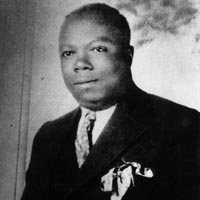
Benjamin "Bennie" Moten
Born in Kansas City, November 13, 1893, Bennie Moten learned to play the piano from his mother. As a child, he played valve trombone with a juvenile band led by Dan Blackburn and studied music with Charles T. Watts and Thomas "Scrap" Harris. He graduated from Crispus Attucks school and attended Lincoln High School, but before graduating left to pursue a career in music.
A talented pianist and good businessman, Moten hustled up work in the small clubs dotting 18th Street. Moten, along with Major N. Clark Smith, Dan Blackburn, Charles T. Watts and others helped establish Local 627. In 1918, Moten formed the B.B.&D. Orchestra with drummer Dude Langford and vocalist Bailey Hancock. The band's name was drawn from the first letter of their first names. According to Langford, they privately referred to themselves as "big, black and dirty." The band prospered under Moten's leadership, ![]() playing the Labor Temple and other top venues.
playing the Labor Temple and other top venues.
In 1922, Moten formed the first band to bear his name, the ![]() Bennie Moten Orchestra. The five-piece band featured Thamon Hayes on trombone, Willie Hall on drums, Woody Walder on reeds and Lamar Wright on cornet. The next year,
Bennie Moten Orchestra. The five-piece band featured Thamon Hayes on trombone, Willie Hall on drums, Woody Walder on reeds and Lamar Wright on cornet. The next year, ![]() Bennie Moten's Kansas City Orchestra recorded for the
Bennie Moten's Kansas City Orchestra recorded for the ![]() Okeh label accompanying vocalists Ada Brown and Mary Bradford. While in the studio, the Moten band recorded two instrumentals:
Okeh label accompanying vocalists Ada Brown and Mary Bradford. While in the studio, the Moten band recorded two instrumentals: ![]() Crawdad Blues and
Crawdad Blues and ![]() Elephant's Wobble, which are considered the first recordings of Kansas City jazz. By recording as Bennie Moten's Kansas City Orchestra, Moten drew a distinction between Kansas City and the other cradles of jazz—New Orleans, New York and Chicago. In the coming years, the Moten band became the leading band in Kansas City and the first to break out nationally.
Elephant's Wobble, which are considered the first recordings of Kansas City jazz. By recording as Bennie Moten's Kansas City Orchestra, Moten drew a distinction between Kansas City and the other cradles of jazz—New Orleans, New York and Chicago. In the coming years, the Moten band became the leading band in Kansas City and the first to break out nationally.


